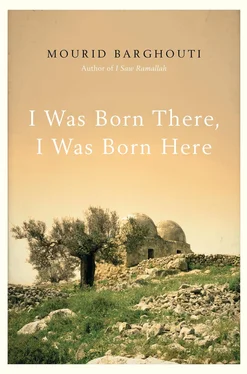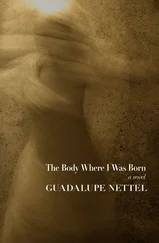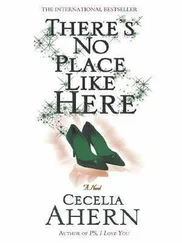“Ma‘rouf al-Rusafi is praising ‘Omar al-Salih al-Barghouti, Rafif’s grandfather, after the British Mandate authority pardoned him and he returned from banishment.”
“Which year?”
“1920.”
“What did he do?”
“He took part in a demonstration in Jerusalem against Jewish immigration and the British Mandate, so the British banished him to Acre.”
“Have you seen Acre?”
“I saw it for the first time last year.”
I leave him standing, finishing al-Rusafi‘s poem, and stretch out on the couch.
The longing to relax after the tension of the journey makes me fall into a nap, or something like one. I find myself back in the only time I saw Acre, the summer before.
I was fifty-three years old that summer and had never been to Acre. The checkpoints weren’t many at the time. Hikmat, my friend and host, said, “Come with me to Jenin. We’ll spend a day and a night there, and then I’ll show you Acre, Nazareth, Jaffa, and Haifa.”
I stood on the walls of Acre. Immediately, a row of question marks lined up in front of me, all pointing the same way: “How was a city like this lost?”
A wall of dark presence, almost black in color. It curves with the beach, straightens out where the beach does, and curves again. Then you think it’s disappeared but it returns to view. Towering. A battleship from below, from above it looks like an unlucky fishing boat. Wide. With the exaggeration to which the scene lends itself, I think, “If you played football on it, you’d think the ball would never fall into the sea or the city, but remain always on top” (of course it would fall, but the illusion was close to being real). What made me think of football in this historic place? Who would play with whom? Who would lose? Who would win? And was it a game I was thinking of or the war that a whole nation lost? At this point, I put my finger on an idea that struck my body full on, like a wave: Palestine didn’t fall in a war that had a beginning and an end, like the wars we’re familiar with. Wars big and small, from the Trojan War to the Vietnam War to the Second World War and more, begin and then end and you know, with a precision befitting the human mind, that you’ve lost or you’ve won. Then you think about what to do next and that’s the end of it. But Jewish warships didn’t come and bombard and breach this wall in an attack on the people of Acre. It’s still here, where it always has been and as it always has been. No power besieged a Palestinian army, thus allowing it to raise the white flag and end everything with a final winner and loser. I think to myself Palestine was lost through drowsiness, slumber, and trickery. Every time we tried to wake up, we found death and cruel displacement to places of exile, to other pillows and to other mistakes — and yes, I do mean mistakes (and we’re still making them). All this happened with a relentless slowness. How can an entire nation drowse? How could we have been so heedless — so heedless that our homeland became theirs?
Our enemy caught us at a moment of historic backwardness, as though we were incapable of realizing what would happen before it happened or at the moment it was happening, and perhaps we’re still incapable of realizing it even now that it has happened. Or could it be that we did and do realize but are too weak to right the scales now that they’ve tilted? Will our scales stay tilted forever? For part of forever? Till when, exactly? It’s unclear. As painfully unclear as a wolf’s bite.
I think to myself, we didn’t lose Palestine in war that we may now behave like the defeated and we didn’t lose Palestine in a debate that we can get it back with proofs.
Our enemy caught us at the low point of our weakness, at the low point of our drowsiness.
We have the power now to tell our grandchildren that drowsiness will not be their lot forever, or even for part of forever.
We have the power to remind them of that strange proverb coined by our ancestors, “Had Acre feared the sea’s roar, it would never have stood on the shore!”
All the same, we have to admit to them, and before them to ourselves, that we are responsible too. Our ignorance is responsible and our historical short-sightedness is responsible, along with our internal struggles, our tribal-familial logic, and the way we were let down by our Arab ‘strategic depth,’ which is made up of states enamored to the point of scandal with their colonizers. Nevertheless, we cannot take this as a reason to stay silent. We have to break the state of denial with which the world confronts us. We shall tell the tale the way it has to be told. We shall tell our personal histories one by one and shall recount our little stories as we have lived them and as our souls and eyes and imaginations remember them. We shall not let history be the history of great events, of kings and officers and books on dusty bookshelves. We shall recount what happened to us personally and the life stories of our bodies and our senses, which to the naïve will seem trivial, incoherent, and meaningless. The meaning is etched upon each individual woman, man, child, tree, house, window, and on every grave before which the national anthem will not be sung and which the historian’s blind pen will not describe. We shall retell history as a history of our fears, our anxieties, our patience, our pillow lusts, and improvised courage. As a history of the making of an evening meal, of stories of love, innocent and otherwise, of emotions hidden from the grown-ups. As a history of the goat bombed by planes in its field and of the heroism of the child who peed in his pants out of fear but suddenly felt brave and stood, wide-eyed, before the long dark line of tanks. As a history of our secret and public desires, of our jokes and our laughter, of “a wink from her eye at the wedding and the boy went crazy.” A history of all the journeys we have made and all the distances we have crossed or been forbidden to cross and of every straightforward, ordinary trip between two cities or two situations. A history of our making fun of our leadership and our mockery of their decorations, medals, and military ranks. A history of the obstinacy of our bodies and of our souls, no record of which is to be found in archives or registries. We shall make the two-hour electricity cuts to our houses important events because they are important events. We shall make the glance of the child at his friend’s empty desk in Class Four a chapter in his workbook on the living and the dead. We shall enter in the records a story of love destroyed by soldiers, or the head of the family, or the stupidity of the lovers themselves, so as to draw the world’s attention to the loss of a love story that concerns the world. I shall record our sitting on the wall of Acre and eating a meal of fish in Christo’s restaurant like any tourist who has come from far away. I shall record the history of this fish meal too, and here I am, writing it. I shall make of every feeling that ever shook my heart an historic event and I shall write it.
From Acre we headed straight for Nazareth and Haifa, but before reaching these we went by the house of Ahmad al-Shuqayri, a native of Acre who lost his city in the Nakba of 1948. A refugee, he obtained an education and became a lawyer. The first chairman of the Palestinian Liberation Organization died, however, without seeing Acre again, as liberator, visitor, or tourist, and was laid to rest in Amman.
At the Church of the Annunciation in Nazareth, we found ourselves at the heart of our history, in the midst of a group of tourists from Japan, most of them nuns. We were coming full circle. I said to Hikmat, “Let’s be Japanese tourists today. This place will be ours for an hour or so, and then we’ll leave.” I told myself that I’d write the history of these seconds during which I felt I was a Japanese tourist. I thought, I wish Tawfiq Zayyad were alive so that I could visit him in this city of his that he never left and whose mayor he was for many years. I thought, did the communist poet really have to go by car to Jericho to congratulate Arafat on his return to the homeland, only to be killed in a traffic accident on the way back? He thus deprived us all of his wit and his patriotic poems that we learned by heart as children, and also of his valiant deeds in the Knesset, where he raised his fist in the faces of Shamir, Sharon, and Netanyahu, clenched it hard, and shouted in Hebrew, “You want to throw me out of the session because I’ve got you all by the balls. By the balls, you child killers!”
Читать дальше











